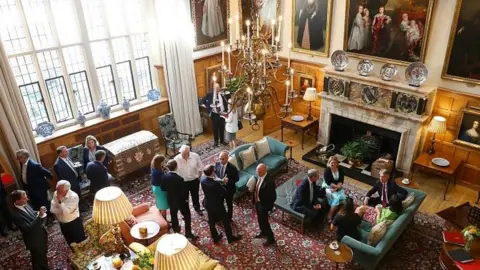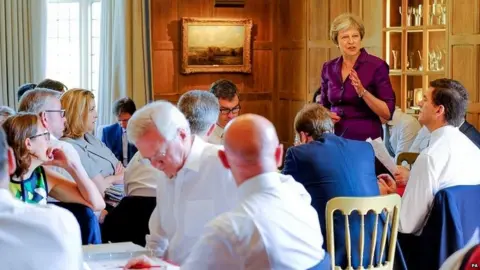Brexit: Cabinet agrees 'collective' stance on future EU deal
The cabinet has reached a "collective" agreement on the basis of the UK's future relationship with the EU after Brexit, Theresa May has said.
Ministers have signed up to a plan to create a free trade area for industrial and agricultural goods with the bloc, based on a "common rule book".
They also supported what could amount to a "combined customs territory".
The BBC's Laura Kuenssberg said the plan, agreed after a 12-hour meeting, would "anger many Tory Brexiteers".
Our political editor said the prime minister had "picked a side" by opting for a closer relationship with the EU than many colleagues desired - and she now had to sell it to her party and the other European leaders.
No 10, she added, hoped the new commitments would unlock the next phase of talks with the rest of the EU but it was not yet clear how many, or what kind, of objections were raised.
Downing Street said the proposals marked a "substantial evolution" in the UK's position and would resolve outstanding concerns about the future of the border between Northern Ireland and the Irish Republic.
"This is a proposal that I believe will be good for the UK and good for the EU, and I look forward to it being received positively," Mrs May told the BBC.
One pro-Brexit cabinet minister told the BBC there was "no point" pushing for a vote as "we were well and truly outnumbered by 20 to seven".
'Lowest common denominator plan'
Nicholas Watt, political editor of BBC Newsnight, said the minister also warned that "it will be a problem" if there is any attempt to "water down plans even further" should the EU reject the UK's proposals.
 PA
PAThe UK said it now wanted to accelerate the negotiations in an effort to secure an agreement by October, but also warned it will step up preparations for leaving on 29 March 2019 without a deal.
The EU's negotiator Michel Barnier, who earlier suggested the EU would be willing to shift its position if the UK relaxed some of its "red lines", tweeted his reaction:
Allow X content?
The prime minister had gathered her 26 cabinet ministers together at her country residence to try and resolve differences over the shape of the UK's relations with the EU and break the current deadlock with the EU.
The main details of the Chequers statement are as follows:
- The UK would accept continuing "harmonisation" with EU rules on the trade in goods, covering only those necessary to ensure frictionless trade
- Parliament would have the final say over how these rules are incorporated into UK law, retaining the right to refuse to do so
- There will be different arrangements for trade in services, including financial products, with greater "regulatory flexibility" and "strong reciprocal arrangements"
- Freedom of movement as it stands will come to an end but a "mobility framework" will ensure UK and EU citizens can continue to travel to each other's territories and apply for study and work
- A new customs arrangement will be phased in, with the goal of "a combined customs territory"
- The UK will be able to control its own tariffs and develop an independent trade policy
- The jurisdiction of the European Court of Justice will end but the UK will pay regard to its decisions in areas where common rules were in force.
Mrs May said this was an "important step" in the process of negotiating the UK's smooth exit from the EU.
"Of course we still have work to do with the EU in ensuring that we get to that end point in October. But this is good we have come today, following our detailed discussions, to a positive future for the UK," she said.
She said the proposals, to be formally published in a white paper next week, would give the UK the freedom to strike trade deals with other countries while maintaining regulatory, environmental and consumer standards.
In a letter sent to all Conservative MPs, she said she had allowed colleagues to express their views while policy was developed but "agreement on this proposal marks the point where this is no longer the case and collective responsibility is fully restored".
There is no mention in the document of either the single market or the customs union, which the UK has committed to leave after the end of a transition period in December 2020.
Under plans for a free trade zone, the UK would be committed legally to following EU law for a large part of the economy, including manufacturing and farming.
While Parliament would retain the right to diverge from EU regulations in these areas, the document makes clear that "choosing not to pass the relevant legislation would have consequences for market access, security co-operation or the frictionless border".
 PA
PAThe document also commits the government to step up preparedness for a no-deal scenario, as one of a range of possible outcomes, "given the short period remaining before the necessary conclusion of negotiations".
The CBI employers group welcomed the proposals for a free trade area in goods which it said would provide a "confidence boost" to business.
Shadow international trade secretary Barry Gardiner said there was "a danger that this is a lowest common denominator plan" designed to hold the cabinet together, rather than "secure the strong negotiating position that we need with the EU".
He told BBC Radio 4's Today programme: "Once upon a time we were told 'Brexit means Brexit', now we are told it means maintaining a common rulebook for all goods, a joint institutional framework for interpreting the agreement and the UK and EU forming this combined customs territory.
"That looks very much like regulatory alignment, the ECJ (European Court of Justice) and half a customs union to me."
Warnings over the deal
Transport Secretary Chris Grayling, who backed Brexit in the referendum, said the deal would end free movement of people and would end the remit of the European Court of Justice in the UK - saying that UK judges always pay regards to other countries' courts, such as Canada or Hong Kong.
He added, on BBC Radio 4's Today programme, that the cabinet had agreed to step up preparations for the UK leaving the EU without a Brexit deal.
Fellow cabinet Brexiteer Andrea Leadsom also tweeted her backing for the deal:
Allow X content?
Leading Tory backbench Brexiteer, Jacob Rees-Mogg told the same programme that it was difficult to say whether or not the agreement was meeting the party's manifesto commitments on Brexit because he had seen only a three page summary rather than the full 100-plus page document.
He said it was "possible", when the detail emerged, that the proposal could be "worse than no deal".
And Sir Vince Cable, leader of the Liberal Democrats, said it could be the case that "Brexiteers have signed up to it knowing perfectly well that it is not going to pass the European Union and they'll then be able to blame Europe for the fact that it won't work".
Pro-Brexit campaign group Leave Means Leave said it would represent a "bad deal for the UK" which would "only slide further as the EU takes more and more".
Former UKIP leader Nigel Farage said the plan amounted to a "sell-out to global corporates" and would do nothing for the 90% of British firms which do not export to Europe.
Veteran Eurosceptic Tory MP Sir Bill Cash said he was "deeply disappointed to say the least" about the plans, which he suggested could contradict the terms of the EU Withdrawal Act passed by MPs last month.
